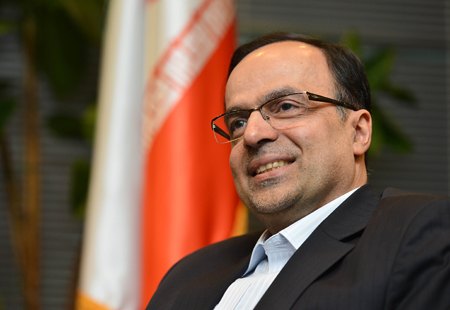‘Sanctions won’t stop bilateral ties from growing’

Iranian Ambassador to Korea Ahmad Masoumifar speaks during an interview. / Korea Times photo by Shim Hyun-chul
The top Iranian envoy to Korea said the two countries have cleared all hurdles that have kept Korean oil refining companies from importing oil from Iran.
On July 1, SK Innovation and Hyundai Oil Bank had to halt oil imports from Iran due to European Union sanctions which banned European insurance companies from selling policies to oil tankers carrying Iranian oil.
Iran has asked Korea to resume imports to this year’s agreed level, offering to provide insured oil tankers. However, Korea has been cautious about taking the offer up over the past two months.
“If other countries don’t intervene, our relations would increase. After its (European Union) sanctions, there were some difficulties and problems. Now, both parties sit together and find out the way and solution to continue to import and export,” Ambassador Ahmad
Masoumifar said during an interview. “I think we can sort this problem. We want Korean companies to continue to import (oil).”
An official from Hyundai Oil Bank said the first oil tanker from Iran is expected to arrive in October, but refused to elaborate on company decisions and other details about imports.
Oil is the No. 1 export commodity for Iran, and accounts for nearly 10 percent of Korea’s total oil imports.
Masoumifar labeled the EU sanction a big “failure” as it will steal business opportunities for European insurance and other companies.
“They (European companies) lose more than Iran. They lose the Iranian market. Some Asian countries have begun to replace them, (for example) Indian and Chinese companies.”
The European Union was the last to impose sanctions on Iran in response to its alleged attempt to develop a nuclear weapons program. The Iranian ambassador rejected the allegations, calling them “totally groundless.”
Iran and Korean ties date back to 1962. The ties withered after the Iranian Revolution in 1979, and recovered in 1989 in the wake of the Iran-Iraq War.
Now, commerce is the main pillar of relations, with oil, gas, electronic goods and automobiles as top trading goods.
The ambassador said that there was room for the two countries to further expand business and cultural exchanges.
“I think cultural relations also have very big rooms. As you know, for example, here in Seoul, you have one famous street — Tehran
Street — a symbol of friendship. In Tehran, we have two places by the name of Seoul — Seoul St. and Seoul Park.”
He said Western media reports often paint the image of Iran negatively, but “after they (people) visit Iran, they change their imagination.”
No collaboration with NK
He dismissed speculation that Iran and North Korea have been collaborating in developing nuclear weapons in Iran.
Yet, speculation has already been there, and again flared up last week after Park Ui-chun, North Korea’s foreign minister, and Iran’s Science Research and Technology Minister Farhad Daneshjoo signed an agreement to cooperate in science and technology in Tehran. Park was part of the North Korean delegation that attended the Non-Alignment Movement (NAM) summit.
The Iranian Labour News Agency said the two countries will cooperate in research, exchange students and run joint laboratories in the fields of information technology, engineering, biotechnology, renewable energy, the environment, sustainable development of agriculture and food technology.
The ambassador said the technology pact with North Korea was no different from partnership agreements it signed with other nations.
Masoumifar advocated the role of NAM, founded in 1961, in the international political and economic arena. With 120 member states,
NAM is the second biggest international organization after the United Nations in size.
The envoy said the fact that the Secretary General of the U.N. Ban Ki-moon attended speaks volumes for the significance of the summit. Ban visited Iran despite opposition from the United States.
“He (Ban) attended because he believes this organization is very important,” the envoy said.
He disputed views that NAM is no longer relevant, “The structure of the U.N. is also from the Cold War, and it’s still continuing.”
Palestine is the only NAM member state that doesn’t have U.N. membership. The summit’s final declaration condemned Israel for
occupying the Palestinian territory, and supported the creation of a Palestinian state.
The envoy was adamant that Israel is a threat to regional and global security, and the only way forward to peace and stability is for Israel to end its occupation of Palestinian territory.
Would dialogue with Israel be an option?
“It’s not useful,” he said.
Israel and the United States have recently been sending signals of possible military attacks on nuclear facilities in Iran. “We are prepared to defend ourselves. And they know that we have the capacity (to defend ourselves),” the ambassador said. <The Korea Times/Kim Se-jeong>]
























































